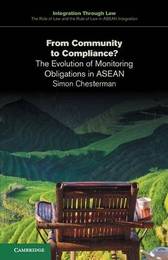
|
From Community to Compliance?: The Evolution of Monitoring Obligations in ASEAN
Paperback / softback
Main Details
| Title |
From Community to Compliance?: The Evolution of Monitoring Obligations in ASEAN
|
| Authors and Contributors |
By (author) Simon Chesterman
|
| Series | Integration through Law:The Role of Law and the Rule of Law in ASEAN Integration |
|---|
| Physical Properties |
| Format:Paperback / softback | | Pages:198 | | Dimensions(mm): Height 215,Width 139 |
|
| ISBN/Barcode |
9781107490512
|
| Classifications | Dewey:341 |
|---|
| Audience | | Professional & Vocational | |
|---|
| Illustrations |
3 Line drawings, unspecified
|
|
Publishing Details |
| Publisher |
Cambridge University Press
|
| Imprint |
Cambridge University Press
|
| Publication Date |
16 April 2015 |
| Publication Country |
United Kingdom
|
Description
In the past decade, the Association of Southeast Asian Nations (ASEAN) has transformed from a periodic meeting of ministers to setting ambitious goals of becoming a Community by 2015. ASEAN is now the most important regional organisation in the history of the continent of Asia. An important tension in this transformation is the question of whether the 'ASEAN way' - defined by consultation and consensus, rather than enforceable obligations - is consistent with the establishment of a community governed by law. This book examines the growing interest in following through on international commitments, in particular monitoring implementation and compliance. Key barriers remain, in particular the lack of resources and ongoing resistance to accepting binding obligations. It remains to be seen whether these trends herald a more measured approach to decision-making in ASEAN. Written for practitioners and researchers alike, this important book provides the first systematic survey of monitoring within ASEAN.
Author Biography
Simon Chesterman is Dean of the National University of Singapore Faculty of Law, Editor of the Asian Journal of International Law, and Secretary-General of the Asian Society of International Law. His work has opened up new areas of research on conceptions of public authority, including the rules and institutions of global governance, state-building and post-conflict reconstruction, and the changing role of intelligence agencies. This is his fourteenth book.
|